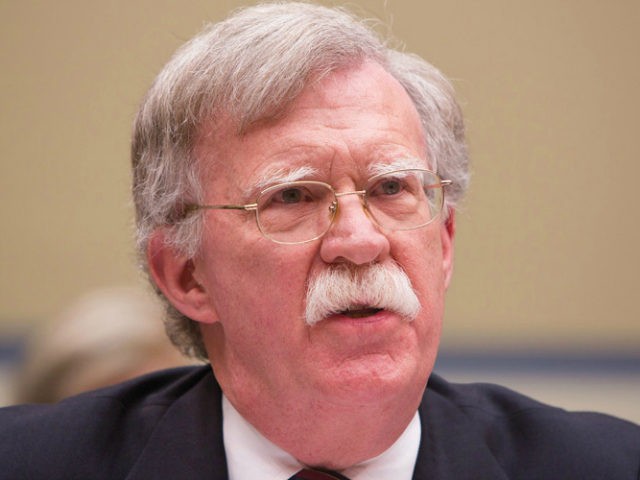Iran’s Foreign Minister Mohammad Javad Zarif on Wednesday accused President Donald Trump’s National Security Advisor John Bolton of being affiliated with terrorists, referring to the exiled Mujaheddin-e-Khalq (MEK) Iranian opposition group.
Iran’s state-run Tasnim News agency reported that Iranian MP Hossein Naqvi Hosseini quoted Zarif as saying one of several “different methods” the United States uses to harm Iran includes its support for the MEK. Zarif reportedly delivered those comments during a Wednesday meeting with members of a parliamentary group at Iran’s Parliament, or Majles.
“The U.S. enmity towards the Islamic Revolution and the Iranian administration will never end,” Hosseini reportedly quoted Zarif as saying.
Tasnim News agency wrote, “The U.S. notion that they can damage the Islamic Republic has been incited by Munafiqeen (MKO members), as John Bolton receives salary from the MKO [MEK Organization] terrorists and attends their gatherings, the lawmaker quoted Zarif as stating.”
Munafiqeen means “hypocrites” in Arabic. In the Quran, munafiqeen are decried as groups who are outwardly Muslim but who secretly conceal their lack of sympathy for fellow Muslims and who are seen as working to undermine the larger Muslim community and its aims.
The MEK was listed as a foreign terrorist organization (FTO) under former President Bill Clinton on July 8, 1997, and delisted on September 28, 2012, under former Secretary of State Hillary Clinton; a move Iran condemned.
The group is part of the Paris-based National Council of Resistance of Iran (NCRI), which is also an exiled Iranian opposition group. The MEK had initially helped with the overthrow of Iran’s late Shah Mohammad Reza Pahlavi in 1979, but it broke with Iran’s Supreme Leader Ayatollah Ruhollah Khomeini soon after the Islamic Revolution and thousands of the group’s members went into hiding in 1981.
The group says they were branded a terrorist organization for political expediency. Many of the same leaders in Iran today worked with the MEK to place Ayatollah Ruhollah Khomeini, founder of Iran’s Islamic Revolution, into power.
“Bolton has repeatedly called for the U.S. help for overthrowing the government in Iran and handing power to MKO terrorists,” Tasnim wrote.
The publication also referred to the group’s annual Paris gathering noting that, last year, Bolton told members of the MEK that President Trump and his administration should recognize the group as a “viable” alternative to the current regime.
In April, Iran’s top security official Ali Shamkhani, said it was “shameful” that the United States, which he described as a “seemingly superpower country,” had appointed a national security adviser who received “a salary from a terrorist sect,” referring to Bolton.
In March, Garrett Marquis, a spokesman for Bolton, said that Bolton “doesn’t respond to propaganda from a government long included on the United States’s list of state sponsors of terrorism,” referring to the Islamic Republic of Iran.
That same month, the Iranian rial dropped to a then-record low of 50,000 rials to the U.S. dollar over uncertainty and fear from Washington, DC, following President Donald Trump’s appointment of Bolton as national security advisor and Mike Pompeo as secretary of state, combined with the fear that the U.S. might withdraw from the Joint Comprehensive Plan of Action (JCPOA), or Iran nuclear deal.
President Trump withdrew the United States from the JCPOA in May and, last week, the rial dropped to a record low of 90,000 rials to the USD. Protests against the regime’s mishandling of the economy have been revived over the past few days and a replete with calls to eradicate the Islamic Republic of its mullahs.
Over 40 percent of Iran’s population is unemployed.
On Tuesday, Iran’s Parliamentary Speaker Ali Larijani blamed Rouhani’s administration for falling short of confronting the country’s deepening economic problem. Iranian President Hassan Rouhani blamed the United States for Iran’s economic strife and said the Islamic Republic is in a “fight” with the U.S, suggesting America is trying to damage the country by creating “an economic war.”
In a Wednesday press release, Secretary of State Mike Pompeo said:
The Iranian government is squandering its citizens’s resources, whether its adventurism in Syria, its support for Hizbollah, Hamas, and the Houthis, or its ambitions for wastefully expanding its nuclear program, it will only add to the suffering of the people of Iran. As I have said before, it should surprise no one that protests continue in Iran. The Iranian people are demanding their leaders share the country’s wealth and respond to their legitimate needs. We condemn the government’s same futile tactics of suppression, imprisonment of protestors, and the denial of Iranians’ frustrations. The people of Iran are tired of the corruption, injustice, and incompetence from their leaders. The world hears their voice.
Thousands of everyday Iranians have taken to the streets of Iran’s Grand Bazaar for the fourth day of protests against the regime, chanting slogans like, “We don’t want the mullahs” and, in a surprising turn away from Iran’s generally anti-Semitic stance, “Death to Palestine!” Instead of investing in its ailing population at home, the regime spends billions of dollars in financial aid on Palestinian terror groups Hamas and Islamic Jihad, Lebanon’s Hezbollah, Yemen’s Houthi rebels, its Shiite militias in Iraq, and its efforts to keep Syrian President Bashar al-Assad in power.
Adelle Nazarian is a politics and national security reporter for Breitbart News. Follow her on Facebook and Twitter.

COMMENTS
Please let us know if you're having issues with commenting.